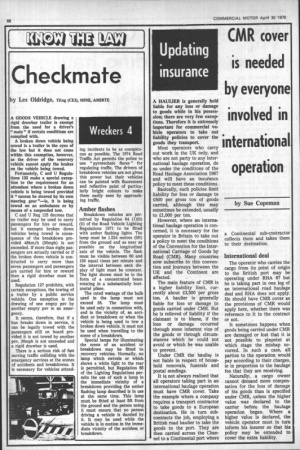Updating insurance
Page 90

If you've noticed an error in this article please click here to report it so we can fix it.
OAR cover
is needed by everyone involved in international operation
by Sue Copeman
A HAULIER is generally held liable for any loss or damage to goods while in his possession; there are very few exceptions. Therefore it is extremely important for commercial vehicle operators to take out liability policies to cover the goods they transport.
Most operators who carry out work in the UK only, and who are not party to any international haulage operation, do so under the conditions of the Road Haulage Association 1967 and will have an insurance policy to meet these conditions.
Basically, such policies limit liability for loss or damage to £800 per gross ton of goods carried, although this may sometimes be extended, usually to £1,000 per ton.
However, where an international haulage operation is concerned, it is necessary for the operator in Britain to take out a policy to meet the conditions of the Convention for the International Carriage of Goods by Road (CMR). Many countries now subscribe to this convention and journeys between the UK and the Continent are affected.
The main feature of CMR is a higher liability limit, currently about £3,500 per gross ton. A haulier is generally liable for loss or damage to goods carried under CMR. But he is relieved of liability if the claimant is to blame, if the loss or damage occurred through some inherent vice of the goods or through circumstances which he could not avoid or which he was unable to prevent.
Under CMR the haulier is not liable in respect of household removals, funerals and postal sendings.
It is not always realised that all operators taking part in an international haulage operation must have CMR cover. Take the example where a company requires a transport contractor to take goods to a European destination. He in turn subcontracts the job, employing a British road haulier to take the goods to the port. They are then carried across the Channel to a Continental port where a Continental sub-contractor collects them and takes them to their destination.
International deal
The operator who carries the cargo from its point of origin to the British port may be operating under RHA 67 but he is taking part in one leg of an international road haulage deal and RHA does not apply. He should have CMR cover as the provisions of CMR would apply here, whether there was reference to it in the contract or not.
It sometimes happens when goods being carried under CMR are damaged or lost that it is not possible to pinpoint at which stage the mishap occurred. In such a case, all parties to the operation would pay according to their charges, ie in proportion to the haulage fee that they are receiving.
Naturally, a cargo owner cannot demand more compensation for the loss of damage of his goods than is specified under CMR, unless the higher value was declared to the carrier before the haulage operation began. Where a higher value is declared, the vehicle operator must in turn inform his insurer so that his policy may be extended to cover the extra liability.
















































































































































